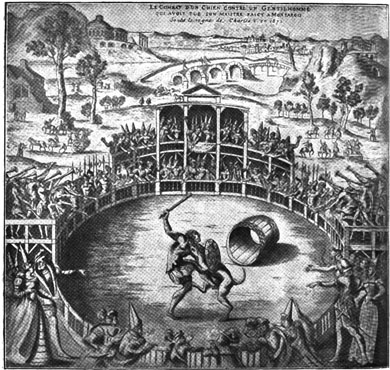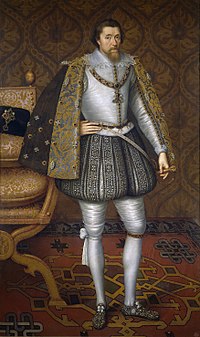Medieval History
Trial by combat between a dog and his master's murderer

The picture represents the famous trial by combat between the dog "Dragon" and the Chevalier Richard Macaire, the murderer of its master, Aubri de Mondidier, which occurred in the year 1371. The assassination took place in the Forest of Bondy, and the dog not only showed the spot in the forest where the body of his master was buried, but singled out the murderer. The King granted a judicial combat between the dog and the suspected man, in which the dog came off completely victorious.
more...
Two rings: an anecdote with a moral
This anecdote is actually taken straight from a Catholic Catechism by Joseph Baxter.
A certain monarch caused the figure of an angel to be carved in white marble. From the left hand of this statue hung a silver ring attached to a thin silken cord, while the right hand held a golden ring suspended from a diamond chain.
The king's son and daughter asked their father what these two rings were intended to signify. He answered: "I will give the rings to whichever of you can guess their meaning aright." Then the prince said: " The rings are doubtless emblems of friendship and love." more...
Love and Glory
In the year 863, Harold destroyed the host of princes who had long divided Norway, and united the whole of the provinces under his own dominion. Being enamoured of Gida, the daughter of Prince Eric, of Hadaland, he sent some persons of his suit to conduct her to court. "Tell your master," said the high-born princess, " that I will never consent to marry him, until he shall reign over the whole of Norway, more...
The Poor Animal: a Prisoner's Dog
FATAL SYMPATHY. One of the prisoners in the Port Royal, or Port Libre, during the government of Robespierre, had brought a favorite dog with him to prison. The poor animal ate, drank, and slept, with its master, until it was deprived of him by a denunciation from one of the prison spies, and his consequent death. The dog now became an interesting object in the prison, and was caressed by everybody. One gentleman in particular, an intimate friend of the deceased, was overheard by one of these guillotine providers, as he was apostrophizing the poor beast in the following terms : "Poor fellow, what will now become of you. more...
King Philip II and Titian's famous painting
When Titian's famous painting of the Last
Supper arrived at the Escurial, the king, Philip
II., proposed to cut the canvas to the size of the
pannel in the refectory, where it was designed
to hang. El Mudo (Philip's "deaf and dumb" painter),
who was present, to prevent the
mutilation of so capital a work, made earnest
signs of intercession with the king, to be permitted
to copy it, and reduce it to the size of the
place assigned for it, offering to do it in the space
of six months. more...
Generosity of King Edward III
When Calais was besieged by Edward III. in 1347, John de Vienne, the governor, turned out of the town every individual who did not possess a sufficient supply of provisions for several months. Men, women, and children, to the amount of seventeen hundred persons, advanced in mournful procession to the English camp. Edward ordered them to be received, gave them a plentiful repast, and at their departure, distributed to each two pieces of silver. We are sorry to add, that five hundred more, that were turned out, did not experience similar humanity, but perished between the walls and the camp. more...
The Oxford Dragon
Jacob Bobart the younger, and son of a German horticulturist of the same name, who superintended the Physic Garden in Oxford, in the seventeenth century, once played an ingenious hoax on the learned of that university. He found a large dead rat in the garden, and transformed it by art into the shape of a dragon, as represented in old and curious books of natural history, particularly in Aldrovandus. This was shown to various learned men, all of whom believed it to be a genuine and invaluable specimen of the dragon. Many fine copies of verses were written by the literati, in honor of Bobart and his matchless discovery, and persons flocked from all parts to see it. Bobart owned the cheat some years after, but it was for a long time preserved as a masterpiece of art.
From The Percy Anecdotes
more...
"King Arthur" Merry-making at sea
This is another gameused at sea, when near the line, or in a hot latitude. It is performed as follows. A man, who is to represent King Arthur, ridiculously dressed, having a large wig made out of oakum, or of some old swabs, is seated on the side, or over a large vessel of water. Every person in his turn is to be ceremoniously introduced to him, and to pour a bucket of water over him, crying, "Hail, King Arthur!" If during this ceremony the person introduced laugh- or smiles, (to which his majesty endeavours to excite him, by all sorts of ridiculous gesticulations), he changes place with, and then becomes, King Arthur, till relieved by some brother tar, who has as little command over his muscles as himself.
From The Olio, Or, Museum of Entertainment
more...
Gonella, a jester of Borda, Duke of Ferrara
"For the love of the saints, give a poor blind man alms!"
"Pray pity the poor blind; and Heaven preserve your
precious eyesight!"
"Born blind, gracious signer; bestow your charity on
one who never saw light!"
Thus prayed three blind beggars, as Gonella passed by
them to Mass. "Poor fellows!" said the jester, "there is
a florin, divide it amongst you." He gave nothing at all;
and as those who stood near smiled, he put his finger on his
lips, to enjoin silence.
"May Heaven reward you in Paradise!" said the blind
men, in chorus; and a moment after, " Let us share the
signor's charity." But as neither had any florin, and as no
one believed that he was not being robbed by his fellow?.
they fell to savage words, and from savage words to blows,
fiercely striking at each other with their crutches till heads
were broken and bleeding; and Gonella passed in to
prayers, with the complacent comment, " Blessed are the
peace-makers !"
From The history of court fools by John Doran
more...
Genealogy hunter: A court jester's wizdom.
Frederick of Saxony, surnamed the Sage, rendered his claim to this title doubtful, by his attention to the descent of his family. A celebrated genealogist had told him, that a copy of his pedigree was preserved in Noah's ark. To substantiate this account, the prince neglected all affairs of state, to the great regret of his ministers, who remonstrated with him on the absurdity, but all to no purpose. At length his cook, who was his favorite buffoon, desired an audience of him, when he told the emperor, that this curiosity to know his origin was neither useful nor honorable. "At present," said the jester, " I look upon you as subordinate only to the Deity; but if you search into Noah's ark, perhaps I shall discover that you and I are cousins, as we have all had our relations there." What the serious advice of his ministers could not effect, was performed by the emperor's cook.
From: The Percy Anecdotes by Sholto Percy
more...
King's clemency

Sir Thomas More (1480-1535) when told that the sentence of death pronounced upon him had been changed to one of simple decapitation, by clemency of the king, said: 'I pray God to spare my friends from a similar clemency.
more...
Maximilian I and a beggar
A beggar once asked alms of the Emperor Maximilian I., who bestowed upon him a small coin. The beggar appeared dissatisfied with the smallness of the gift, and on being asked why, he replied that it was a very little sum for an emperor, and that his highness should remember that we were all descended from one father, and were therefore all brothers. Maximilian smiled good-humouredly, and replied: "Go�go, my good man: if each of your brothers gives you as much as I have done, you will very soon be far richer than me." more...
King's Jester

King James was complaining one time of the leannesse of his Hunting Horse, and swore by his sole he could see no reason but his should be as fat as any of his subjects; for he bestow'd upon him as good feeding,keeping, and as easy riding as any one did, and yet the jade was leane. Archee, his foole, standing by, told him, "If that be all, take no care: I'll teach your Majestie a way to raise his fleshe presently; and if he be not as fat as ever he wallow, you shall ride me." "I pr'y thee, foole, how?" sayd the King. " Why, doe but make him a Bishoppe, and I'le warrant you," sayes Archee.
more...
Librarian to Francis I

The famous Duval, librarian to the Emperor Francis the First, often used to reply to questions that were put to him, "I do not know." An ignoramus one day said to him, "But the emperor pays you for knowing." "The emperor," he replied, "pays me for what I know; if he were to pay me for what I am ignorant of, all the treasures of his empire would not be sufficient."
more...
Thomas Aquinas

St. Thomas possessing an ardent mind, devoted it to the studies then in vogue, scholastic philosophy and theology. In the latter, indeed, he was so eminently successful, that Bucer said of him: Tolle Thomam, et Ecciesiam Romam subverterem: "Take away St. Thomas, and I will effect the downfall of the Roman Church."
more...
Thomas Aquinas - bos mutus
THIS extraordinary person, like many men
of great talents, showed in his early youth none of
that liveliness and vivacity of disposition which is
but too often mistaken for quick parts. He was
called by his companions �bos mutus� (silent ox),
but his master, Albert the Great,
more capable of distinguishing,
used to say of him to those who gave
him that odious appellation: �The learned bellowing
of this silent ox will one day fill up the universe".
more...
Thomas Aquinas and the Pope
St. Thomas was one day with Pope Innocent
the Fourth in his closet, when an officer of his
chancery came in with a bag of gold, procured by
Absolutions and Indulgences. The Pope profanely
said: "See, young man, the Church is not what
it was in the times when it used to say,
Silver and gold have I none"
-- �Holy Father, that is very true,
indeed," replied St. Thomas,
"but then it cannot say to the poor afflicted with
�the palsy, Rise, take up thy bed and walk.�
more...
Louis XII
This father of his people was told that the players
of Paris had the insolence to take him off upon
the Theatre, as an avaricious man who drank
out of a vessel full of pieces of gold, without
being able to quench his thirst. "Buffoons,"
said he coolly, " think they have the privilege to
turn every one into ridicule. I am not more
perfect than the rest of mankind. The idea is
fair enough. I very readily forgive them: and
after all," added he, "I had rather that my
people laughed at my parsimony, than that they
wept at my prodigality."
more...
Louis IX and "a lady of quality"
A Lady of quality once appearing before Louis,
to solicit some favour of him, in a dress too
juvenile for her years, the good Monarch said to her:
"Madam, I will take care of your suit,
if you will take care of your situation. Your beauty
once made a great noise in this kingdom, but
it is passed like a flower in the field. It is in
vain that you endeavour to bring it back again;
you had much better attend to the beat�y of the
mind, which never fades."
more...
Crusade of St. Louis -- Teaching by the Signs
Joinville, in his Memoirs of St. Louis, tells us of a woman who, in the crusade headed by that king, was seen carrying in her right hand a porringer of fire, and in her left a bottle of water. With the fire, Joinville says, she wished to burn paradise, with the water to drown hell, so that none might do good for the reward of the one, nor avoid evil from fear of the other, since every good ought to be done from the perfect and sincere love which man owes to his Creator, who is the supreme good. more...